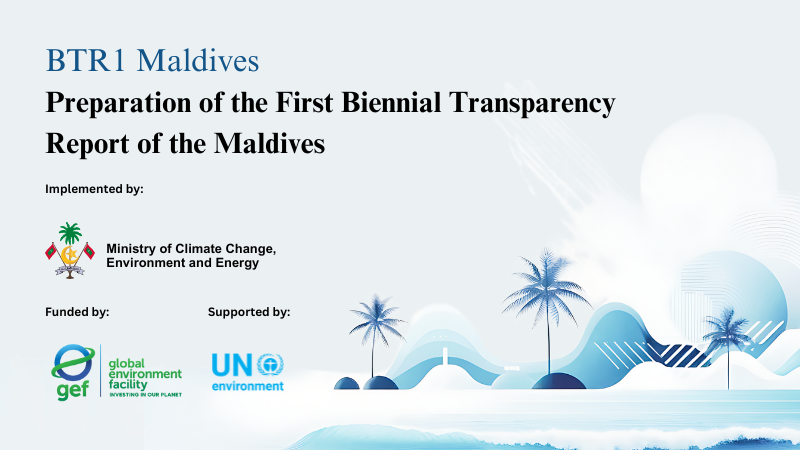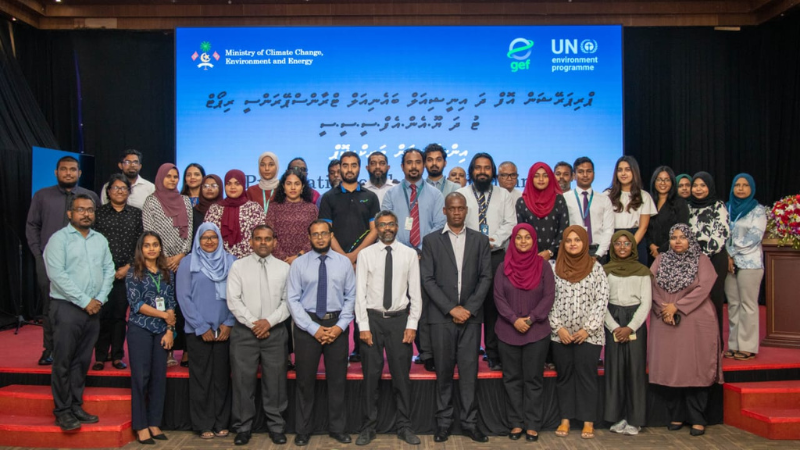Background
Anthropogenic climate change is widely accepted as the most significant environmental challenge faced by the world in the 21st century. The Fifth Assessment Report (AR5) (2014) and the Global Warming at 1.5 0C (2018) special report by the Intergovernmental Panel on Climate Change (IPCC) confirm that climate change is an existential threat for low lying coral islands like Maldives. The Maldives is one of the most vulnerable countries for adverse impacts of global climate change.
Maldives’ Nationally Determined Contribution (NDC) highlights food security, critical infrastructure, public health, water security, coastal protection, and coral reef biodiversity as key vulnerabilities of the country. In addition to these vulnerabilities, Maldives, like other Small Island Developing States (SIDS), face specific developmental challenges. They include high transportation and logistical costs, exploitation of natural resources, poor management of waste and pollution, and a small population leading to unsustainable economies of scale for different development agendas.
The 21st Conference of the Parties (COP21) was a key milestone for the international climate negotiations due to adoption of the Paris Agreement (PA), which came into force in 2016. Maldives was among the first countries to sign and ratify the PA in April 2016. One of the unique aspects of the PA is the contribution of both Annex 1 Parties and non-Annex 1 Parties in climate change mitigation and adaptation efforts in the form of NDCs. Article 13 of the PA outlines the transparency framework relating to the transparency of action and support. The main purpose of the transparency framework is to improve mutual accountability amongst the Parties in terms of their efforts for emissions reduction, adaptation efforts and support needed and received for addressing climate change.
Despite being a country with very limited emissions, the Maldives is committed to support the temperature goal of the PA. Maldives’ submitted a very ambitious updated Nationally Determined Contributions (updated NDC) in October 2020. Maldives aims to achieve net zero emissions by 2030, on condition that extensive support is received. Even if the required support is not received, Maldives has committed to reduce its BAU emissions by 26%.
Parties to the United Nations Framework Convention on Climate Change (UNFCCC) agreed on the Katowice climate package during the 24th Conference of the Parties (COP24) held in Katowice on December 2018. The Katowice climate package included eight guiding principles for the modalities, procedures and guidelines (MPGs) of the Enhanced Transparency Framework (ETF) under the PA, these include 1) Building on and enhancing the transparency arrangements under the Convention, recognizing the special circumstances of the Least Developed Countries (LDCs) and Small Island Developing States (SIDS), and implementing the transparency framework in a facilitative, non-intrusive, non-punitive manner, respecting national sovereignty and avoiding placing undue burden on Parties; 2) The importance of facilitating improved reporting and transparency over time; 3) Providing flexibility to those developing country Parties that need it in the light of their capacities; 4) Promoting transparency, accuracy, completeness, consistency and comparability; 5) Avoiding duplication of work and undue burden on Parties and the secretariat; 6) Ensuring that Parties maintain at least the frequency and quality of reporting in accordance with their respective obligations under the Convention; 7) Ensuring that double counting is avoided; and 8) Ensuring environmental integrity. Furthermore, the ETF requires all Parties to compile national greenhouse gas (GHG) inventories and to report on the implementation of mitigation actions (tracking of NDC implementation) on a regular basis.
The Enhanced Transparency Framework (ETF) was established under the PA as a mechanism to monitor the progress of the NDCs. Countries are expected to track and report progress towards achieving their NDCs, and communicate adaptation actions, including good practices, priorities, needs and gaps, so as to inform the global stock take under Article 14 of the Paris Agreement. Besides submitting National Communications (NCs) every four years, signatory countries will be expected to submit Biennial Transparency Reports (BTRs) including a National Inventory Report every two years starting from December 2024, thus replacing the Biennial Update Reports (BURs).
Project Objective
The objective of this BTR 1 project is to support Maldives prepare and submit its First Biennial Transparency Report (BTR1) that comply with the United Nations Framework Convention on Climate Change (UNFCCC) and in alignment to national development goals, with built-in flexibility provided in light of its capacities. The overall coordination and execution of the BTR process will be undertaken by the Climate Change Department under the Ministry of Climate Change, Environment, and Energy.
Partners Involved
The Maldives BTR project involves collaboration with various national and international partners to ensure comprehensive and effective implementation. Key partners include:
- Energy Department, MCCEE
- Waste Management and Pollution Control Department, MCCEE
- Utility Regulatory Authority (URA)
- Ministry of Finance (MoF)
- Ministry of Tourism
- Ministry of Transport and Civil Aviation
- Minister of Youth Empowerment, Information and Arts
- Ministry of Cities, Local Government and Public Works
- Ministry of Fisheries, Marine Resources, and Agriculture (MoFMRA)
- Ministry of Social and Family Development
- Civil Aviation Authority
- National Disaster Management Authority (NDMA)
- National Bureau of Statistics (NBS)
- National Centre for Information Technology (NCIT)
- Local Government Authority (LGA)
- Maldives Customs Services (MCS)
- State Electric Company (STELCO)
- FENAKA Corporation
- Civil and Community-Based Organizations



